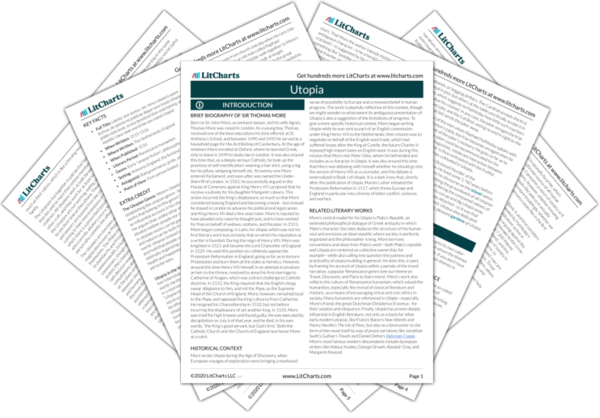Thomas More wrote his Utopia during the so-called Age of Discovery, when European voyages of exploration, especially by sea, were vastly enriching human knowledge about the globe. With discovery, moreover, came a renewed belief in human progress and perfectibility—both ideas that More muses upon in his work.
Utopia is at once a parody of the then-popular genre of the travel narrative—written by explorers about their exciting adventures abroad—and also a vision of a society organized far more coherently than any our history has yet produced: Utopia. Thus More’s fictional narrator, the wise traveller Raphael Hythloday, doesn’t entertain us with death-defying adventures littered with sea monsters and hostile natives, as would be typical of the Renaissance travel narrative, but instead educates us by recalling his intellectual adventures among the Utopians, a hard-working, practical, and virtuous people who have organized their society to maximize human health and happiness. After all, monsters like those in popular travel narratives are easy to find (as More points out), and you don’t even have to go abroad to find them: just look at the proud leaders of European societies, who nurse idleness, punish their citizens cruelly, kill for worthless gold, and wage bloody, unjust warfare. To find citizens like the Utopians who are ruled by good laws, in contrast, is ironically a much harder thing to do.
As earnest as Utopia is about the need for good governance, the work’s playful ambiguities nonetheless invite us to question the possibility of such an ideally organized society as Utopia ever arising on earth. The word “utopia” itself, More’s coinage, sounds like the Greek eutopia, “the good place,” but literally means “nowhere.” (Most of the invented names in the work are jokes in this vein.) But, we might ask, how did Hythloday travel to a place that is nowhere? And is it possible for people to build a utopia, a nowhere, here on earth? According to Hythloday, the island nation is, in fact, located off the coast of the New World, that is, the Americas. Europeans (including Christopher Columbus) optimistically imagined the Americas to be the site of the Garden of Eden, the divinely governed Biblical paradise from which humankind fell after disobeying God. The fact that the New World is at once a physical place and, at least in the Renaissance, a supposed mythical paradise, deepens More’s ambiguities. Can we, as people afflicted by sin and vice, build a society as happy as the paradise where people lived before sin was brought into the world? Complicating the matter even more, finally, is the fact that the capital city of Utopia, Amaurote (“dim city”), is a shadowy but point-for-point copy of More’s London, from its geography to the layout of its walls, streets, and houses. Far from being “nowhere” for More’s contemporary readers, then, Utopia would have seemed, if only in its superficial particulars, strangely familiar.
The implication of these ambiguities regarding place is that, while Utopia exists nowhere, the potential for a utopia exists everywhere. But to travel there we must, like Hythloday—whom we’re told resembles both the great sailor Ulysses and the great philosopher Plato—undertake an arduous intellectual adventure aboard the ship of reason and virtue.
Travel, Discovery, and Place ThemeTracker

Travel, Discovery, and Place Quotes in Utopia
Nothing is more easy to be found than barking Scyllas, ravening Calaenos, and Laestrygons, devourers of people, and suchlike great and incredible monsters. But to find citizens ruled by good and wholesome laws, that is an exceeding rare and hard thing.

Unlock explanations and citation info for this and every other Utopia quote.
Plus so much more...
Get LitCharts A+Utopus…even at his first arriving and entering upon the land [which was to become Utopia], forthwith obtaining the victory [over the natives], caused fifteen miles space of uplandish ground, where the sea had no passage, to be cut and digged up. And so brought the sea round about the land.
As for their [the Utopians’] cities, whoso knoweth one of them knoweth them all, they be all so like one to another as far forth as the nature of the place permitteth.
Every house hath two doors… These doors be made with two leaves never locked nor bolted, so easy to be opened, that they will follow the least drawing of a finger, and shut again alone. Whoso will may go in, for there is nothing within the houses that is private or any man’s own.
They set great store by their gardens. In them they have vineyards, all manner of fruit, herbs, and flowers, so pleasant, so well furnished, and so finely kept, that I never saw thing more fruitful nor better trimmed in any place.
When I consider and weigh in my mind all these commonwealths which nowadays anywhere do flourish, so God help me, I can perceive nothing but a certain conspiracy of rich men procuring their own commodities under the name and title of commonwealth.











